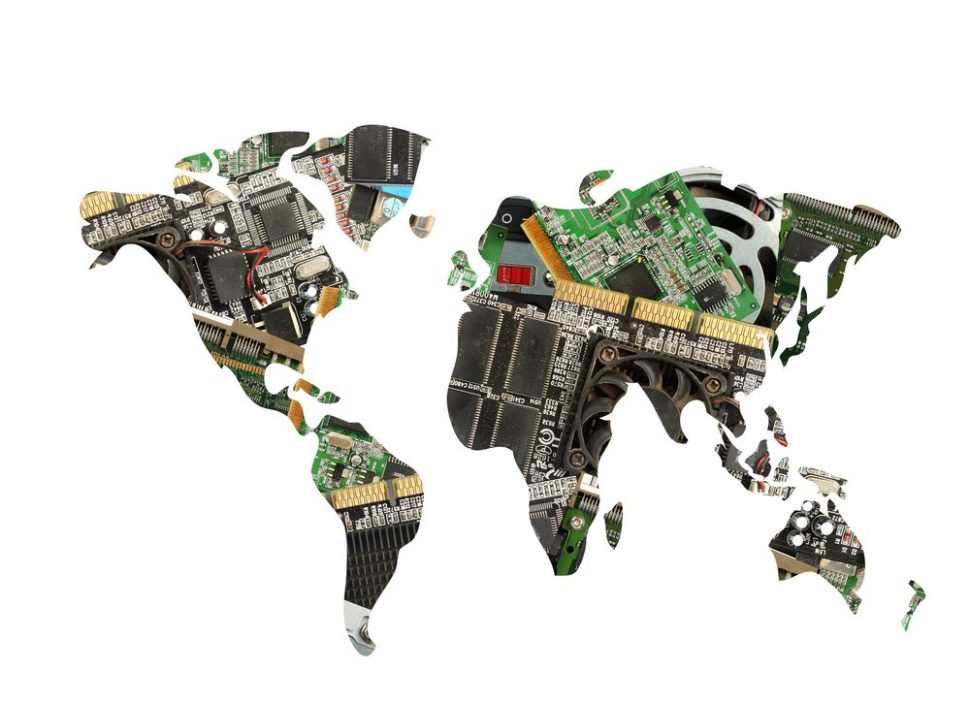Tech companies like Apple are constantly designing and releasing new products for the market. These drive innovation at a huge cost to consumers and the environment–but one man’s trash is another’s treasure.
How can you get the new iPhone without throwing out your old one? How can you upgrade to the newest processor without getting rid of your old one? All of these inevitable upgrades raise a more disturbing question.
Where do all of our “outdated” electronics end up?
Entreprenuers Tackle E-Waste With Circular EconomiesClick To TweetE-Waste: A Looming Threat
Everyone’s favorite sci-fi spoof, the canceled-multiple-times show Futurama lampooned real-life trash problems with their “trash ball” flung into space. They end up jettisoning a second trash ball into the first giant sphere of garbage.
The resulting impact sends the first one straight into the sun. Don’t think about that second trash ball. But these orphan refuse colonies are very real–especially when it comes to electronic waste.
While some outdated electronics are disposed of in environmentally friendly ways, others become e-waste. Not-so-fun fact: there’s a place in Ghana nicknamed “Sodom and Gomorrah” because of the amount of e-waste there. Due to strict electronic refuse laws in both the U.S. and Europe, some “recyclers” may ship them to countries with laxer laws. Thus, you end up with “e-wastelands”.

So who is doing something to fix this before we need to jettison our own e-trash ball? Some countries (and specifically entrepreneurs) are developing circular economies, turning consumerism into e-waste recycling.
Collaboration to Dam Digital Debris
One candidate combating e-waste is an unlikely source: the country of India. Though they had to compete with local scrappers, a few entrepreneurs in India didn’t see a monument to consumerism. Karma Recycling saw an opportunity to recycle e-waste into usable cellphone devices.
Co-director and co-founder Akshat Ghiya told Forbes: “Electronics are so common in our lives, but we’re disposing of everything so quickly. Phones are supposed to last five to six years, but we’re switching them every year, it’s all status symbol.”
In an effort to bring sustainability and fewer e-waste related dangers like toxic fumes, Karma Recycling instituted an e-portal. Retail partners or individuals can sell their old phones to Karma for cash back.
Karma then wipes the device, performs a product backup and refurbish process, then repackages and resells the old product. Buyers even get a new warranty from Karma Recycling.
From Startups to Nonprofits
RecycleForce is another entity making waves in the electronic waste world. Started in 2006, this nonprofit employs people transitioning out of prison in recycling old electronics. 60% of their employees find full-time employment, so their contribution is two-fold: social and environmental.
Both of these entities developed what’s called circular economies. They are self-sustaining in that they mitigate material use and waste by narrowing or closing energy loops.
This stands in contrast to many existing economies that are linear. These have a “Take, make, and dispose of” process which could lead to two separate giant balls of e-trash.
These Countries Get Big Ole Fs on Their E-Waste Report Cards
While China and the U.S. generated more than 30% of the world’s e-waste last year, they don’t top the list of worst offenders.

Believe it or not, Norway is THE worst offender when it comes to electronic waste. People there generate 62.4 lbs. of waste per person. Switzerland follows closely behind with 58 lbs. The U.S. ranks in 9th.
An Unlikely Leader; A Potential Monopoly
Conversely, China is a leader in rare earth recycling (REE)–the latest wave of cleantech and e-waste innovation. The process effectively removes rare earths from magnets AND can lead to the discovery of new magnet alloys from the recycled rare earths. Some say China has a monopoly on this due to low labor costs against the high cost of investment and low yields.
Given recent changes to the EPA, the U.S.’ own Molycorp could make a comeback.

















Comments (0)
Most Recent